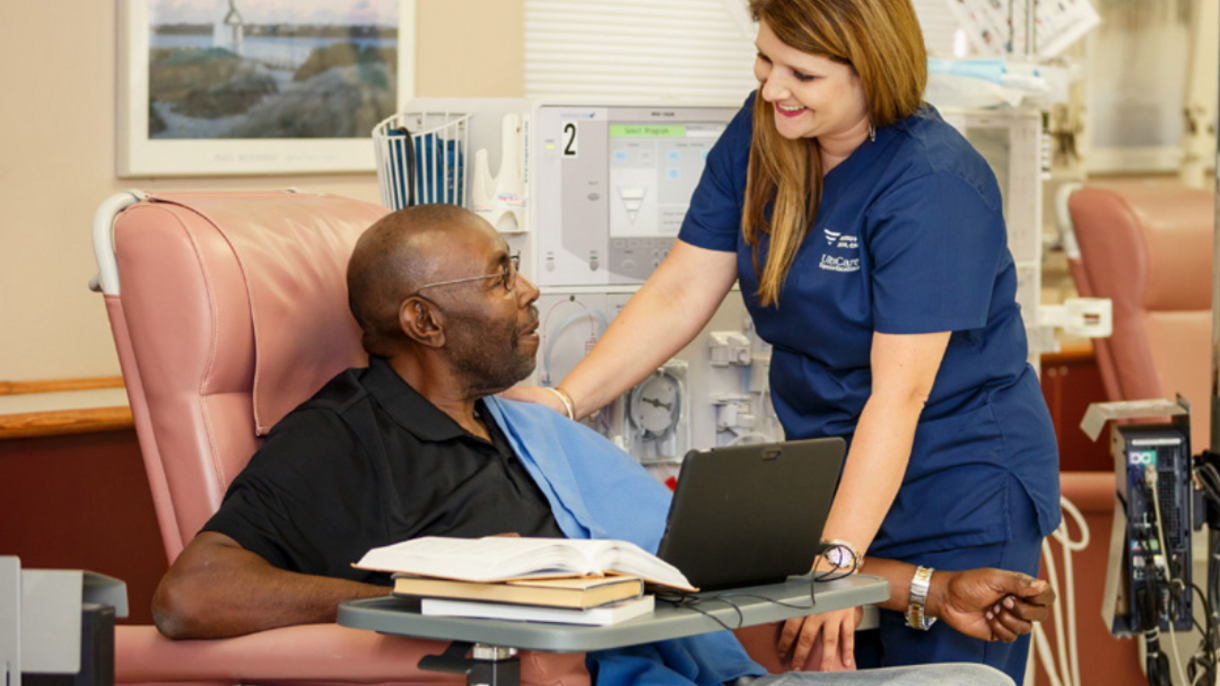At Fresenius Medical Care, we believe it’s important for people with CKD and their loved ones to understand how dialysis works. This guide will help you gain a deeper understanding of this vital treatment.
The Role of the Kidneys
To appreciate the significance of kidney dialysis, it's essential to understand the role of the kidneys themselves. Kidneys remove excess body water and waste products. The excess body water and waste products are then removed from your body in the urine.
Kidneys also regulate electrolytes such as potassium and sodium (“salt”) concentration in your body, produce red blood cells and hormones that help to control blood pressure, and keep your bones strong.
When the kidneys fail, all these essential functions are compromised, and chronic kidney disease develops.
What is Kidney Dialysis?
Kidney dialysis mimics the functions of healthy kidneys by removing waste and excess body water from the bloodstream. It acts as a crucial support system for people whose kidneys can no longer perform these functions.
Peritoneal dialysis (PD) uses a PD solution to fill the peritoneal cavity through a small plastic tube called a catheter. The PD solution remains there for several hours, this is called the dwell time. After the dwell time the used PD solution is drained and replaced with fresh PD solution. This process is called an exchange and is repeated 4 times a day, or overnight.
Haemodialysis uses an “artificial kidney” called a dialyser, and a haemodialysis machine. A portion of blood is pumped through a specially prepared tubing set to the dialyser. The dialyser then removes excess body water and waste products from the blood. The cleaned blood is then returned to the body through the tubing set.
Where does kidney dialysis take place?
Kidney dialysis can take place either in the hospital or at home.
At home…
At home people with chronic kidney failure can have either peritoneal dialysis or haemodialysis.
Peritoneal dialysis is a treatment where excess water and waste products are removed slowly and continuously from the body. It is done seven days a week, and the person undergoing the treatment is free to do all usual activities between the exchanges. It can be performed in two ways - manually (which is typically done during the day) or automatically (using a machine called a cycler, and typically done at night).
For home peritoneal dialysis, regular clinic visits are needed every 4 to 6 weeks and storage space is needed at home. Usually a partner is not required, although a family member or carer can also learn to assist the person if needed.
Haemodialysis can also be performed at home. The time, length and frequency of the home haemodialysis treatment depends on the individual's medical conditions, as well as their lifestyle factors, and is determined by their healthcare professional.
Conventional home haemodialysis is performed during the daytime, typically three times a week for 4–6 hours. Nocturnal home haemodialysis is where HD treatments are performed during the night while the person sleeps. The schedule is either every night or every other night for about 8–10 hours. Short daily home haemodialysis is performed 5–7 times a week for 2–3 hours.
If people with CKD opt for home haemodialysis, sufficient space will be needed for the haemodialysis machine, water treatment system, and medical supplies. (Certain Home Haemodialysis machines have a water treatment system within the device itself). The person undergoing the treatment and, if required, an additional person will need to successfully complete a training programme which is typically between 10 days and 8 weeks long, depending on the device they will be using. Home HD allows for a very flexible schedule without the need of transportation from home to the dialysis unit and back.
In-centre…
People with CKD can also receive haemodialysis treatment in hospital clinics similarly to how it is carried out at home, with medical staff preparing, performing and monitoring the treatment for them.
For haemodialysis, the schedule is usually three times a week for approximately 4–5 hours, and people with CKD also have the option to carry out treatment at a self-care or limited care facility where they can prepare and perform the dialysis themselves.
By understanding the kidney dialysis options available to them, people with chronic kidney failure and their families can make informed decisions appropriate for the individual's circumstances, with their healthcare professional, and manage their condition effectively.
Our team of experts is always here to ensure you’re confident about every aspect of your treatment, so nothing can hold you back from making the most of every day.
